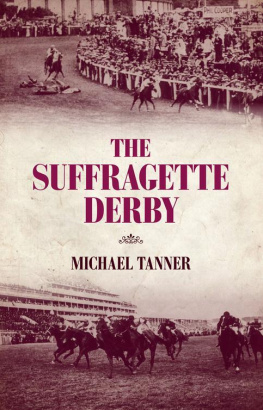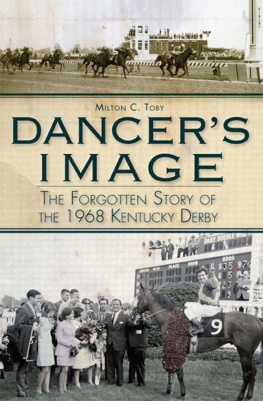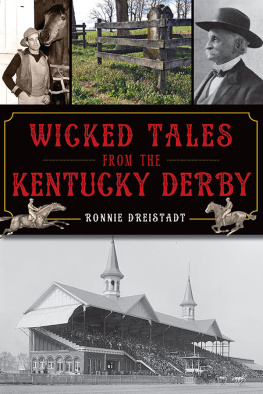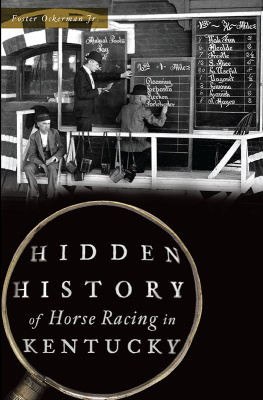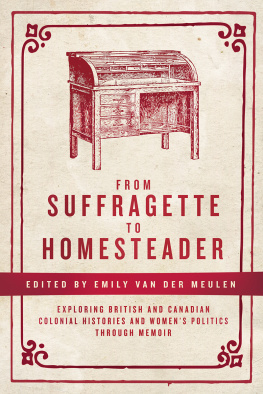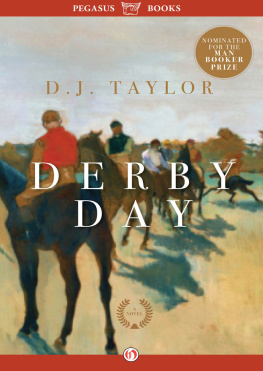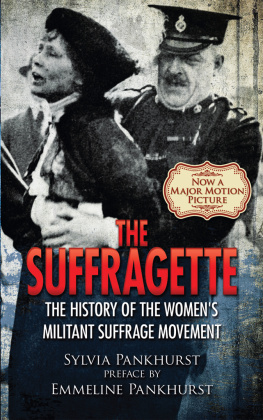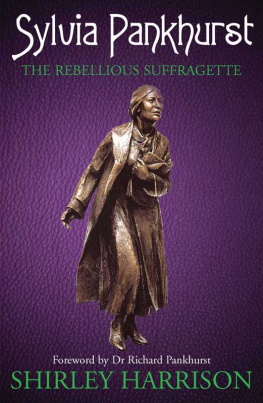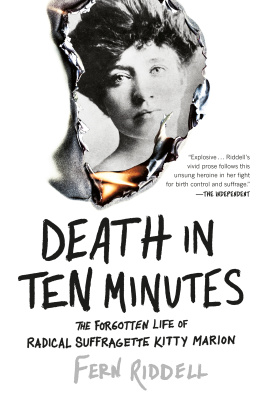T he skies above London on the morning of Wednesday 4 June 1913 hang heavy with cloud, suggesting the forecast of bright sunshine and temperatures in the high 60s to have been misleading . The sun will eventually prevail, however, good news indeed for a quartet of men who are keener than most to inspect the heavens for signs of rain. Their business is horse racing and they desire perfect conditions for a horse race the most famous horse race in the world. Perfect conditions to run the Blue Riband of the Turf: the Derby.
To the woman walking down Kingsway, on the other hand, the weather is of no consequence. It may rain or shine as far as she is concerned. The weather wont make a scrap of difference to her plans for this afternoon. She has made an early start from her lodgings at 133 Clapham Road in order to call in at the headquarters of the Womens Social and Political Union and purchase two flags en route to Victoria station where she intends boarding a race-day special to Epsom Downs. This race-goer has no interest in who might win the Derby. Shes setting out for Epsom to strike a blow for her cause, the suffragette cause dedicated to obtaining Votes for Women. She means to leave Epsom having written her name into the history books. But she has to be back in Kensington by early evening. Shes due to help out at the Suffragette Summer Festival in the Empress Rooms. Her name is Emily Wilding Davison.
Tall and slender, with unusually long arms that lend her an awkwardness, shes wearing a dark blue skirt and matching blouse with a short black jacket edged with silk braid. A light grey felt hat is jammed down on her head, obscuring the mop of thick reddish-brown hair swept up into a fashionable chignon, yet it cant hide the fact that shes no longer in the first flush of youth. Handsome rather than pretty would best describe her looks, even as a teenager. Her face is small and rather square, featuring a strong brow and an equally strong nose separating green eyes described variously as elusive and whimsical. Her mouth is straight, wide and thin, rather severe in repose but frequently caught in a half-smile that one acquaintance compares to the mocking expression of the Mona Lisa. She appears a bit of a battleaxe. Those of a more charitable disposition might settle for frumpy, old-before-her-time, gone to seed, an impression reinforced by a braying haw-haw accent even her friends find grating. Those friends are women. She doesnt court male company. She prefers the companionship of her own sex. She equates men with the Establishment, the boot with its heel on the neck of womankind. She sees her sex denied entry to almost every profession; the inclusion of obey in the marriage vows means precisely that wives surrender personal wealth to husbands whose conjugal rights also run to sex and child-bearing on demand. Under exclusively man-made laws women have been reduced to the condition of legal slavery. But she sees herself as one of the New Women, a class of well-educated women intent on gaining their personal liberty.
Now she sits in a third-class carriage of a race-day special run by the London, Brighton and South Coast Railway, the hubbub swirling around her head which, as ever, tilts to one side as if locked in jaunty contemplation of lifes absurdities. Little wonder she looks worn out. The forty-year-old boasts a charge sheet few hardened criminals can match, because theres no one more committed to the campaign for womens suffrage than she. Shes served seven terms of imprisonment in the past four years, a grand total of eight months incarceration during which she embarked on seven hunger strikes and endured no fewer than forty-nine instances of forcible feeding. Her militancy has graduated from stone-throwing to firing pillar boxes, an escalating fanaticism that worries the suffragette leadership. It has labelled her a self-dramatising individualist, insufficiently capable of acting in the confines of official instructions, clever but headstrong she tends to walk alone.
Thus Davison is more than a rebel with a cause. She is a rebel within her cause; the worst kind of rebel a loose cannon. As a child she didnt play dolls: she played soldiers. Now she sees herself as a soldier of God fighting for womens rights, a Bible never far from her hand. Shes fearless, but also wilful and impulsive , traits that frequently breed misjudgements under pressure and occasion an intimacy with self-destruction; she is a maverick marginalised by her movement as surely as her sexuality edges her toward the fringes of mainstream society. Such slights only serve to make her opposition to the established order all the more zealous and its expression all the more reckless. Indeed, many racehorse owners are becoming alarmed at the prospect of suffragettes like Davison targeting their valuable livestock following numerous arson attacks on deserted racecourse buildings . The Sporting Life spoke up for them, demanding Suffragette liability in the event of any measure of the mad women proving successful. There have been so many rash acts attempted and carried out that the threats cannot be lightly dismissed.
Davisons turmoil mirrored that of the country. Britain was far from a nation at ease with itself. The suffragettes leader, Mrs Emmeline Pankhurst, has incited her membership to rebellion! yet their growing violence cant compare with the explosive forces unleashed by the march of trade unionism, stoked by the yawning gap between the affluent minority and the working-class majority. Recent disputes in the coalfields and the docks have sparked mass demonstrations and rioting. The governments deployment of troops to maintain order resulted in the shooting of three strikers in South Wales. Two warships were even sent up the Mersey. By 1913 industrial disputes are running at 150 a month and Britains Great Unrest enables Leon Trotsky to crow the dim spectre of revolution [is] hanging over Britain. Across the Irish Sea more rebellion festers, as Irish Nationalism and religious strife drive the country to the brink of civil war: I see terrible times ahead, bitter fighting and rivers of blood, confides one Irish leader. Farther afield the Balkans are already a-fire with just the kind of bloody conflict that many Britons dread will engulf the entire European continent. If this constant round of grim headlines in its daily newspapers isnt sufficiently depressing , the nation is obliged to come to terms with the loss of the Titanic and one of its most heroic sons, Scott of the Antarctic. The various struggles of this tempestuous period are coming to a head; the protagonists know there can be no victory without a blood sacrifice. The Irish rebels know it; the suffragettes know it. But on this quintessential English morning all that may be forgotten. For today is Derby Day.
Davison is joining a cross section of Britons that has flocked to Epsom Downs in celebration of this unique occasion every year since 1780. This is the one day Belgravia rubs shoulders with Bermondsey. In a vast crowd consisting of, according to Disraeli, all the ruffiansim that London and every racecourse in the kingdom can produce, she finds viscounts mingling with villains; gypsies haggling with generals; housewives and housebreakers enjoying a well-earned day off. They have been massing since six in the morning for, albeit not the national jamboree of the Victorian era when even parliamentary business is suspended, Derby Day is still the nearest the country comes to the traditional embodiment of Merrie Englande. Epsom Downs is transformed into the Edwardian equivalent of old St Bartholomews Fair, brimming with entertainment and original sin. So many revellers will cram this makeshift arena by three oclock, possibly as many as a quarter of a million, that the only visible blades of grass will be those comprising the one-and -a-half-mile horseshoe that is the Derby course itself. Browned by a week of pleasant summer sunshine, this strip of turf awaits the arrival of the fifteen thoroughbreds who constitute the cream of the current three-year-old equine generation.

